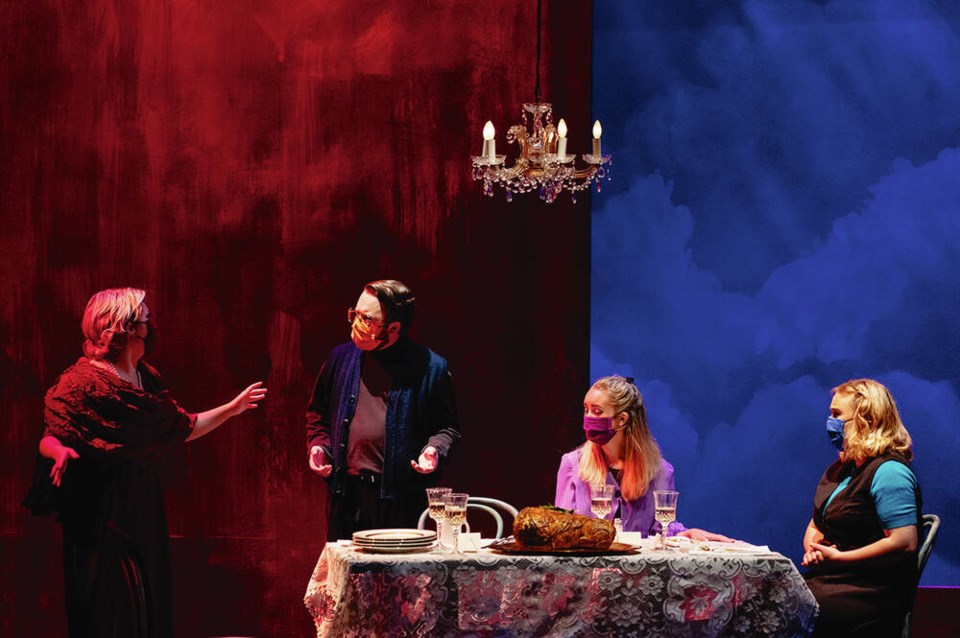I confess to a sinking feeling when it was announced student actors in Dead Man’s Cell Phone would wear COVID masks for most of the play.
What would this mean for this University of Victoria production, marking the theatre school’s triumphant return to live performance in the pandemic era? Would mask-wearing thespians be like musicians wearing gloves? How much can an actor convey with his/her eyes? Would the show be a bit like the Carnival of Venice — and therefore quite weird?
The good news — somehow Thursday’s opening-night performance made it all work. Yes, aside from the occasional uncovering, the actors in Sarah Ruhl’s 2007 absurdist comedy had their mouths and noses covered. Yet curiously, we soon forgot about this. Perhaps it’s because, 20 months in, we’ve become socially adjusted to a masked world.
Dead Man’s Cell Phone is a strange bit of business. When a cell phone rings annoyingly in a cafe, Jean (Jane Rees) picks it up, believing she’s within her rights to stop the din. To her surprise, it transpires the phone’s owner, Gordon (Ryan Kniel), couldn’t pick up because he’s just died in front of his bowl of lentil soup. What follows is an eccentric journey into a bizarro world that’s as real and surreal as any Magritte fantasy.
Jean, well-meaning and meddling, takes it upon herself to become custodian of Gordon’s phone, answering all of his incoming calls. When his survivors — wife, brother, mother, mistress — express grief at his passing, she makes them feel better by inventing tall tales about his final moments. Mom, for instance, is told her estranged son tried to call her at the very end; the mistress is told Gordon expressed his deep love for her just before snuffing it. Jean reinvents history even more deftly than the GOP post-Jan. 6 — everyone is told what they so desperately want to hear.
Ruhl’s dialogue is absurd, eccentric and unrelentingly smart. Her oddball humour may not be for everyone — the couple in front of me bolted after intermission. But most people, as I did, will find her Oscar Wilde-for-the-21st-century witticisms a rare treat. At one point Gordon’s mother, Mrs. Gottlieb, declares Jean to be comforting like “a very small casserole.” Later we learn she called her other son Dwight because she “felt sorry for the name”.
There’s much to like about this production. As Jean, the well-cast Rees emerged as the show’s heart and soul, charming us with her warmth, exuberance and canny comic knack.
Kniel, playing Gordon, finally gets to talk in Act II, delivering a long and potentially challenging monologue with confidence and brio (topics include organ harvesting and the danger of losing one’s soul on modern transit).
Occasionally Maddy El Baroudi — overall a strong stage presence as Mrs. Gottlieb — fell into an oddly stilted delivery. Happily this tendency faded as the play progressed. The cast includes Holly Hamilton (Hermia), Branden Sugden (Dwight) and Taylor Williams (Carlotta).
Designer Patrick Du Wors’ lighting is notable. In one scene Gordon, making an entrance amid fog and film-noir jazz, is illuminated by a floor-level green light giving him a spectacular Dashiel Hammett shadow five metres high.
Du Wors’ set is dominated by a monumental structure (brushed steel/cement look) representing the building that frames the cafe’s front window. The immensity of this opening, dwarfing the tables inside, may be a nod to Edward Hopper’s painting Nighthawks, famously depicting lonely folk in a late-night diner.
Bold attention to detail elevates this production. Everything choreographer Jacques Lemay touches is a delight, whether a fight scene involving a lamp in the shape of a human kidney or a set change that transforms into charming formal dance. During one love-making scene, tiny houses and a shower of papers drop from the sky; elsewhere a retro model of an airliner bisected the horizon, earning its own applause.
Fran Gebhard — whose sure hand reveals a firm understanding of Ruhl’s humour — says Hopper was an inspiration in her direction of the play. Certainly the painter’s fascination with human isolation in a modern age parallels the Ruhl’s own themes.
The playwright finds irony in the fact we embrace technology to connect with others, yet find ourselves isolated by our ubiquitous electronic devices. And there’s more. Are Jean’s white lies a metaphor for the solace of religion? Is Gordon’s slice-and-dice business a comment on contemporary commerce and political practices?
With Dead Man’s Cell Phone, Ruhl wants us to laugh in the theatre — and think on the drive back home.
- - -
Some livestreamed shows are being offered.

